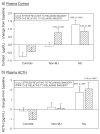Stress system changes associated with marijuana dependence may increase craving for alcohol and cocaine
- PMID: 23280514
- PMCID: PMC3660143
- DOI: 10.1002/hup.2280
Stress system changes associated with marijuana dependence may increase craving for alcohol and cocaine
Abstract
Objective: To date, little research exists defining bio-behavioral adaptations associated with both marijuana abuse and risk of craving and relapse to other drugs of abuse during early abstinence.
Method: Fifty-nine treatment-seeking individuals dependent on alcohol and cocaine were recruited. Thirty of these individuals were also marijuana (MJ) dependent; 29 were not. Twenty-six socially drinking healthy controls were also recruited. All participants were exposed to three 5-min guided imagery conditions (stress, alcohol/cocaine cue and relaxing), presented randomly, one per day across three consecutive days. Measures of craving, anxiety, heart rate, blood pressure, plasma adrenocorticotrophic hormone and cortisol were collected at baseline and subsequent recovery time points.
Results: The MJ-dependent group showed increased basal anxiety ratings and cardiovascular output alongside enhanced alcohol craving and cocaine craving, and dampened cardiovascular response to stress and cue. They also demonstrated elevated cue-induced anxiety and stress-induced cortisol and adrenocorticotrophic hormone levels, which were not observed in the non-MJ-dependent group or controls. Cue-related alcohol craving and anxiety were both predictive of a shorter number of days to marijuana relapse following discharge from inpatient treatment.
Conclusions: Findings provide some support for drug cross-sensitization in terms of motivational processes associated with stress-related and cue-related craving and relapse.
Copyright © 2012 John Wiley & Sons, Ltd.
Conflict of interest statement
CONFLICT OF INTEREST
The authors declare that they have no competing financial interests pertaining to the aims and results of this study.
Figures




Similar articles
-
Frequency of recent cocaine and alcohol use affects drug craving and associated responses to stress and drug-related cues.Psychoneuroendocrinology. 2005 Oct;30(9):880-91. doi: 10.1016/j.psyneuen.2005.05.002. Psychoneuroendocrinology. 2005. PMID: 15975729 Clinical Trial.
-
The effects of exogenous progesterone on drug craving and stress arousal in cocaine dependence: impact of gender and cue type.Psychoneuroendocrinology. 2013 Sep;38(9):1532-44. doi: 10.1016/j.psyneuen.2012.12.022. Epub 2013 Jan 29. Psychoneuroendocrinology. 2013. PMID: 23374328 Free PMC article. Clinical Trial.
-
Sex-specific dissociations in autonomic and HPA responses to stress and cues in alcohol-dependent patients with cocaine abuse.Alcohol Alcohol. 2009 Nov-Dec;44(6):575-85. doi: 10.1093/alcalc/agp060. Epub 2009 Sep 30. Alcohol Alcohol. 2009. PMID: 19793926 Free PMC article.
-
Clinical and laboratory assessment of the subjective experience of drug craving.Clin Psychol Rev. 2009 Aug;29(6):519-34. doi: 10.1016/j.cpr.2009.06.002. Epub 2009 Jun 11. Clin Psychol Rev. 2009. PMID: 19577831 Review.
-
Compulsive drug-seeking behavior and relapse. Neuroadaptation, stress, and conditioning factors.Ann N Y Acad Sci. 2001 Jun;937:1-26. doi: 10.1111/j.1749-6632.2001.tb03556.x. Ann N Y Acad Sci. 2001. PMID: 11458532 Review.
Cited by
-
Treatment of co-occurring anxiety disorders and substance use disorders.Harv Rev Psychiatry. 2015 Mar-Apr;23(2):99-111. doi: 10.1097/HRP.0000000000000058. Harv Rev Psychiatry. 2015. PMID: 25747923 Free PMC article. Review.
-
Building better strategies to develop new medications in Alcohol Use Disorder: Learning from past success and failure to shape a brighter future.Neurosci Biobehav Rev. 2019 Aug;103:384-398. doi: 10.1016/j.neubiorev.2019.05.014. Epub 2019 May 18. Neurosci Biobehav Rev. 2019. PMID: 31112713 Free PMC article. Review.
-
Needed Relapse-Prevention Research on Novel Framework (ASPIRE Model) for Substance Use Disorders Treatment.Front Psychiatry. 2015 Mar 6;6:37. doi: 10.3389/fpsyt.2015.00037. eCollection 2015. Front Psychiatry. 2015. PMID: 25798112 Free PMC article. Review. No abstract available.
-
Stress modulates illness-course of substance use disorders: a translational review.Front Psychiatry. 2014 Jul 17;5:83. doi: 10.3389/fpsyt.2014.00083. eCollection 2014. Front Psychiatry. 2014. PMID: 25101007 Free PMC article. Review.
-
Biobehavioral and affective stress responses during nicotine withdrawal: Influence of regular cannabis co-use.Psychopharmacology (Berl). 2024 Feb;241(2):253-262. doi: 10.1007/s00213-023-06481-w. Epub 2023 Oct 28. Psychopharmacology (Berl). 2024. PMID: 37897498
References
-
- Agrawal A, Neale MC, Prescott CA, Kendler KS. A twin study of early cannabis use and subsequent use and abuse/dependence of other illicit drugs. Psychol Med. 2004;34(7):1227–37. - PubMed
-
- Anggadiredja K, Nakamichi M, Hiranita T, et al. Endocannabinoid system modulates relapse to methamphetamine seeking: possible mediation by the arachidonic acid cascade. Neuropsychopharmacology. 2004;29 (8):1470–8. - PubMed
-
- Berg JC, Laberg A, Skutle A, Ohman A. Instructed versus pharmacological effects of alcohol in alcoholics and social drinkers. Behav Res Ther. 1981;19:55–66. - PubMed
Publication types
MeSH terms
Grants and funding
LinkOut - more resources
Full Text Sources
Medical

